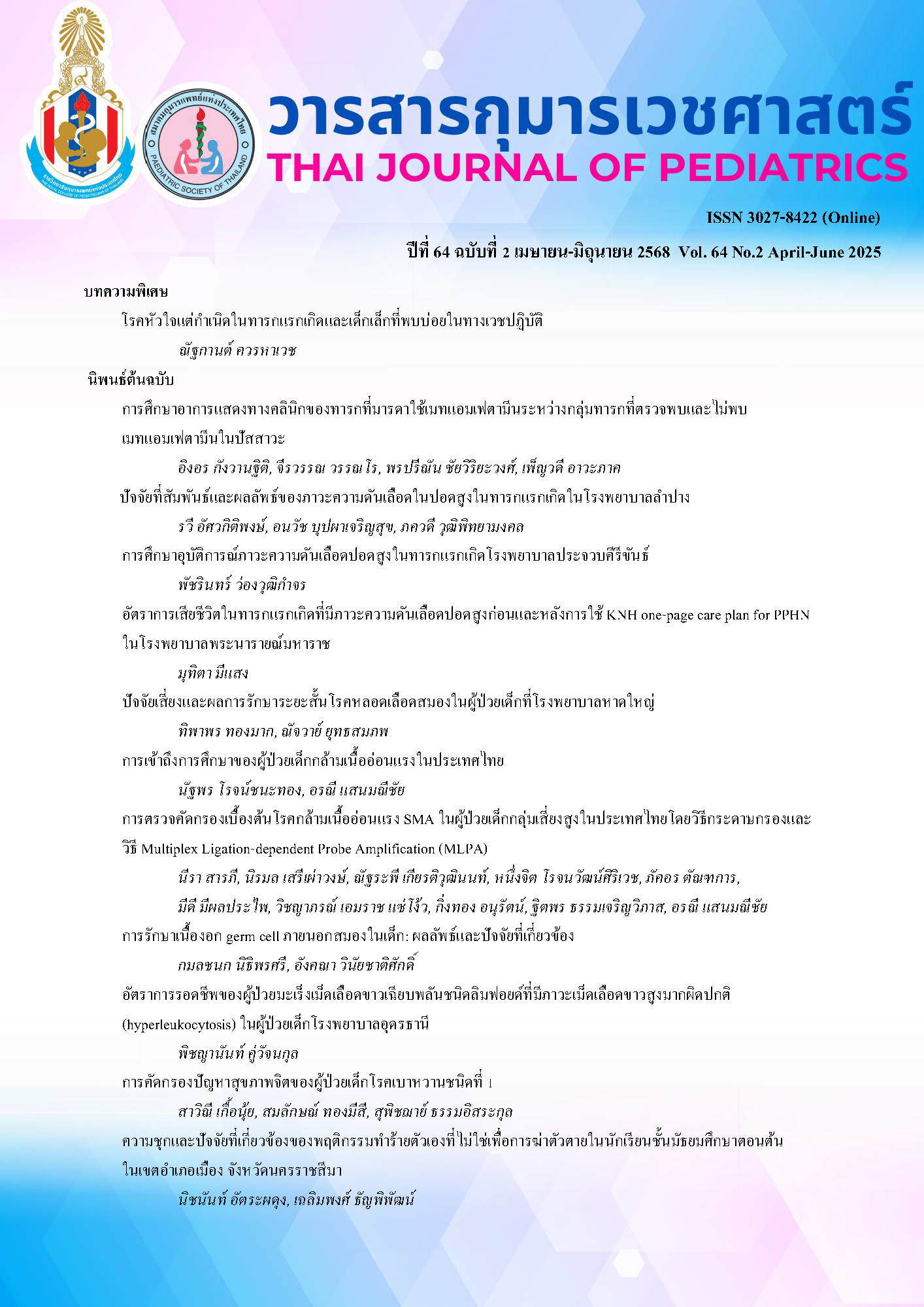Mental health screening in children with type 1 diabetes mellitus
Keywords:
Childhood type 1 diabetes mellitus, Mental health, Strengths and difficulties QuestionnaireAbstract
Background: The global incidence of type 1 diabetes mellitus (T1DM) in children and adolescents has been increasing by 2–5% annually, a trend mirrored in Thailand. Currently, the incidence in Thailand is approximately 1.27 per 100,000 population. Children with T1DM are at higher risk of developing mental health problems compared to healthy children, with reported rates of 30.56% and 15.56%, respectively. Early identification of psychological issues can lead to timely interventions and support holistic care in children with diabetes.
Objectives: To assess the mental health status of children with T1DM and to identify factors associated with increased risk of mental health problems.
Method: A cross-sectional study was conducted in T1DM patients aged 4–16 years old at Chonburi Hospital (Oct 2023–Oct 2024). The Strengths and Difficulties Questionnaire (SDQ) was completed by parents and children (aged 11–16 years old). Descriptive and inferential statistics were used.
Results: Among 74 participants, the mean age was 10.6 ± 3.6 years, and 55.4% were female. According to the SDQ completed by parents for children aged 4–16 years, 14.9% had abnormal total difficulties scores. For children aged 11–16 years, parent and self-reports indicated emotional or behavioral problems in 14.9% and 9.8% of cases, respectively. Peer relationship problems were the most common difficulty reported (36.5% by parents and 9.8% by self-report). Having diabetes for three years or more was significantly associated with mental health difficulties.
Conclusion: Mental health screening using the SDQ indicated that children with type 1 diabetes are at risk for emotional and behavioral problems, highlighting the need for ongoing surveillance.
Downloads
References
Onkamo P, Vaananen S, Karvonen M. Worldwide increase in incidence of type I diabetes-the analysis of the data on published incidence trends. Diabetologia. 1999;42:1395–403.
Gillespie KM, Bain SC, Barnett AH, Bingley PJ, Christie MR, Gill GV, et al. The rising incidence of childhood type 1 diabetes and reduced contribution of high-risk HLA haplotypes. Lancet. 2004;364:1699-700.
Gale EAM. The rise of childhood type 1 diabetes in the 20th century. Diabetes. 2002;51:3353–61.
International Diabetes Federation. Type 1 diabetes. [Internet]. 2020 [cited 2020 July 3]. Available from: https://www.idf.org/aboutdiabetes/type-1-diabetes.html.
Jaruratanasirikul S, Thammaratchuchai S, Sriplung H. Trends of childhood diabetes in Southern Thailand: 20-year experience in a tertiary medical center. World J Pediatr. 2017;13:566-70.
Trepatchayakorn S. Trends and characteristics of childhood diabetes in a tertiary care center in Thailand. Asian Biomed. [Internet]. 2015 [cited 2020 Dec 5]. Available from: https://www.semanticscholar.org/paper/Trends-and-characteristics-of-childhood -diabetes- in-Trepatchayakorn /152d6a2713a34147 c0e5abf708d011bcf6f5008a.
Deerochanawong C, Ferrario A. Diabetes management in Thailand: A literature review of the burden, costs, and outcomes. Global Health. 2013;9:11.
Almeida MC, Claudino DA, Grigolon RB, Fleitlich-Bilyk B, Claudino AM. Psychiatric disorders in adolescents with type 1 diabetes: a case-control study. Braz J Psychiatry. 2018;40:284-9.
Zenlea IS, Mednick L, Rein J, Quinn M, Wolfsdorf J, Rhodes ET. Routine behavioral and mental health screening in young children with type 1 diabetes mellitus. Pediatr Diabetes. 2014;15:384-8.
Boogerd EA, Damhuis AM, van Alfen-van der Velden JA, Steeghs MC, Noordam C, Verhaak CM, et al. Assessment of psychosocial problems in children with type 1 diabetes and their families: the added value of using standardised questionnaires in addition to clinical estimations of nurses and paediatricians. J Clin Nurs. 2015;24:2143-51.
Wongpiromsarn Y, Wipulakorn P, Nuanmanee S, Woerner W, Mongkol A. Strengths and Difficulties Questionnaire (SDQ) Thai improved version: change and administration. J Ment Health Thai. 2011;19:128–34.
Toh ZQ, Koh SSL, Lim PK, Lim JST, Tam W, Shorey S. Diabetes-related emotional distress among children/adolescents and their parents: A descriptive cross-sectional study. Clin Nurs Res. 2021;30:311-21.
Duffus SH, Cooper KL, Agans RP, Jain N. Mental health and behavioral screening in pediatric type 1 diabetes. Diabetes Spectr. 2019;32:171-5.
Stahl-Pehe A, Lange K, Bachle C, Castillo K, Holl RW, Rosenbauer J. Mental health problems among adolescents with early-onset and long-duration type 1 diabetes and their association with quality of life: a population-based survey. PLoS One. 2014;9:e92473.
Brodar KE, Davis EM, Lynn C, Starr-Glass L, Lui JHL, Sanchez J, et al. Comprehensive psychosocial screening in a pediatric diabetes clinic. Pediatr Diabetes. 2021;22:656-66.
Sassmann H, Kim-Dorner SJ, Berndt V, Biester T, Dehn-Hindenberg A, Heidtmann B, et al. Understanding daily, emotional, and physical burdens and needs of parents caring for children with type 1 diabetes. J Diabetes Res. 2022;2022:9604115.
Harrington KR, Shapira A, Volkening LK, Butler DA, Anderson BJ, Wasserman RM, et al. Associations of diabetes self-management characteristics, HbA1c, and psychosocial outcomes with depressive symptoms in a contemporary sample of adolescents with type 1 diabetes. J Diabetes Complications. 2021;35:107838.
Dogan B, Oner C, Akalin AA, Ilhan B, Caklili OT, Oguz A. Psychiatric symptom rate of patients with diabetes mellitus: A case control study. Diabetes Metab Syndr. 2019;13:1059-63.
Downloads
Published
How to Cite
Issue
Section
License
Copyright (c) 2025 The Royal College of Pediatricians Of Thailand

This work is licensed under a Creative Commons Attribution-NonCommercial-NoDerivatives 4.0 International License.



